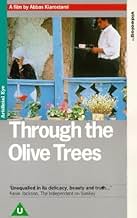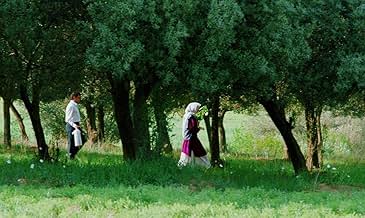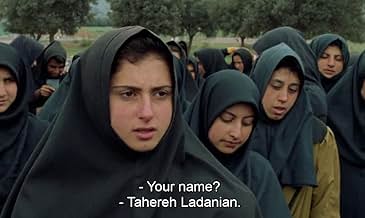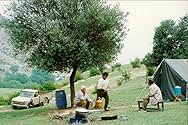IMDb-BEWERTUNG
7,7/10
11.011
IHRE BEWERTUNG
Eine Darstellung der Beziehung zwischen den Schauspielern, die in dem Film And Life Goes On (1992) das Brautpaar spielen.Eine Darstellung der Beziehung zwischen den Schauspielern, die in dem Film And Life Goes On (1992) das Brautpaar spielen.Eine Darstellung der Beziehung zwischen den Schauspielern, die in dem Film And Life Goes On (1992) das Brautpaar spielen.
- Regie
- Drehbuch
- Hauptbesetzung
- Auszeichnungen
- 5 Gewinne & 6 Nominierungen insgesamt
Ostadvali Babaei
- Teacher
- (as Astadouli Babani)
Nosrat Bagheri
- Achiz
- (as Nasret Betri)
Khodabakhsh Defaei
- Teacher
- (as Kheda Barech Defai)
Hossein Jafarian
- Hossein
- (Nicht genannt)
Jafar Panahi
- Panahi
- (Nicht genannt)
Empfohlene Bewertungen
10Red-125
Reviewer's Note: The Iranian movie Zire darakhatan zeyton (1994) was shown in the U.S. with the title Through the Olive Trees. The film was written and directed by Abbas Kiarostami.
The movie is the third of a series of films entitled "The Koker Trilogy." Koker is a small village 200 miles northwest of Tehran. No one outside Iran would know anything about Koker, except for Kiarostami's films. He used Koker as the setting for the first film in the trilogy-Where is the Friend's House? (1987). (This is an amazing movie, with an IMDb rating of 8.1.) However, Koker was still just an obscure village.
Koker is now famous because of a horrible tragedy that took place in the region on June 21, 1990. A devastating earthquake destroyed Koker and many surrounding villages. The loss of life was immense--about 50,000 people died, including 20,000 children. Almost all the buildings were destroyed. Kiarostami directed two more films about Koker. Now, the location is well known to Iranians and cinephiles.
In real life, director Kiarostami and his son traveled to Koker five days after the earthquake occurred. They wanted to find out if the two brothers who starred in the first film had survived the earthquake. Kiarostami turned his trip into a movie. That film was And Life Goes On (1992). He found that despite the immense grief felt by the local people, life did, indeed, go on.
Through the Olive Trees stars Mohamad Ali Keshavarz as The Film Director. He's the only professional actor in any of the three movies. As is usual for Kiarostami, the other actors are local amateurs. Farhad Kheradmand plays Farhad. He was also in And Life Goes On. Zarifeh Shiva portrays Mrs. Shiva, who is the director's assistant.
In this film, Kiarostami has made a movie about making a movie. The movie they are making is And Life Goes On. There's no shortage of movies about making movies. However, I've never seen a movie about making a movie that already exists. It's a brilliant concept, because we can recognize segments of And Life Goes On as they appear in Through the Olive Trees.
However, Through the Olive Trees is really about the relationship of two young people. Hossein Rezai portrays Hossein, who had a four-minute, but important, segment in And Life Goes On. In that segment, he tells us that he and his wife were married the day after the earthquake. They were engaged, the wedding had been planned, and they went ahead with it. This demonstrated a key element of And Life Goes On--the couple embodied the human desire to pick up the pieces and move forward with life, and with replacing death with new life.
In this movie, we learn that Hossain has fallen in love with the woman who played the young wife--Tahereh. However, Tahereh (portrayed by Tahereh Ladanian) apparently wants nothing to do with Hossain. Tahereh lost both of her parents in the earthquake, so she now lives with her grandmother. Her grandmother absolutely rejects Hossain because he's illiterate and doesn't own a house. That makes sense, except that Hossain is intelligent and ambitious, and truly loves the young woman.
So, what we have is a plot within a movie about making a movie. It sounds confusing, but it works.
Kiarostami is famous for using panoramic long shots, and this is what we see at the end of the film. The closing long shot is amazing and unforgettable, but ambiguous.
This is an amazing movie. It has an extremely high IMDb rating of 7.8. I rated it 10. It worked well enough on the small screen, but of course it would be better in a theater. We saw it on a Criterion DVD, sold with the other two movies in the trilogy. The films may be available separately, which would be OK. However, the Criterion edition has many video extras, along with a written essay by noted film critic Godfrey Cheshire.
I would say that the three trilogy movies are all must-see films if you love great international cinema. Find them and watch them.
IMPORTANT: The trilogy should be seen in order of production: Where is the Friend's House? then, And Life Goes On, then, Through the Olive Trees. The movies will each work separately, but they won't work as well if seen out of that order.
The movie is the third of a series of films entitled "The Koker Trilogy." Koker is a small village 200 miles northwest of Tehran. No one outside Iran would know anything about Koker, except for Kiarostami's films. He used Koker as the setting for the first film in the trilogy-Where is the Friend's House? (1987). (This is an amazing movie, with an IMDb rating of 8.1.) However, Koker was still just an obscure village.
Koker is now famous because of a horrible tragedy that took place in the region on June 21, 1990. A devastating earthquake destroyed Koker and many surrounding villages. The loss of life was immense--about 50,000 people died, including 20,000 children. Almost all the buildings were destroyed. Kiarostami directed two more films about Koker. Now, the location is well known to Iranians and cinephiles.
In real life, director Kiarostami and his son traveled to Koker five days after the earthquake occurred. They wanted to find out if the two brothers who starred in the first film had survived the earthquake. Kiarostami turned his trip into a movie. That film was And Life Goes On (1992). He found that despite the immense grief felt by the local people, life did, indeed, go on.
Through the Olive Trees stars Mohamad Ali Keshavarz as The Film Director. He's the only professional actor in any of the three movies. As is usual for Kiarostami, the other actors are local amateurs. Farhad Kheradmand plays Farhad. He was also in And Life Goes On. Zarifeh Shiva portrays Mrs. Shiva, who is the director's assistant.
In this film, Kiarostami has made a movie about making a movie. The movie they are making is And Life Goes On. There's no shortage of movies about making movies. However, I've never seen a movie about making a movie that already exists. It's a brilliant concept, because we can recognize segments of And Life Goes On as they appear in Through the Olive Trees.
However, Through the Olive Trees is really about the relationship of two young people. Hossein Rezai portrays Hossein, who had a four-minute, but important, segment in And Life Goes On. In that segment, he tells us that he and his wife were married the day after the earthquake. They were engaged, the wedding had been planned, and they went ahead with it. This demonstrated a key element of And Life Goes On--the couple embodied the human desire to pick up the pieces and move forward with life, and with replacing death with new life.
In this movie, we learn that Hossain has fallen in love with the woman who played the young wife--Tahereh. However, Tahereh (portrayed by Tahereh Ladanian) apparently wants nothing to do with Hossain. Tahereh lost both of her parents in the earthquake, so she now lives with her grandmother. Her grandmother absolutely rejects Hossain because he's illiterate and doesn't own a house. That makes sense, except that Hossain is intelligent and ambitious, and truly loves the young woman.
So, what we have is a plot within a movie about making a movie. It sounds confusing, but it works.
Kiarostami is famous for using panoramic long shots, and this is what we see at the end of the film. The closing long shot is amazing and unforgettable, but ambiguous.
This is an amazing movie. It has an extremely high IMDb rating of 7.8. I rated it 10. It worked well enough on the small screen, but of course it would be better in a theater. We saw it on a Criterion DVD, sold with the other two movies in the trilogy. The films may be available separately, which would be OK. However, the Criterion edition has many video extras, along with a written essay by noted film critic Godfrey Cheshire.
I would say that the three trilogy movies are all must-see films if you love great international cinema. Find them and watch them.
IMPORTANT: The trilogy should be seen in order of production: Where is the Friend's House? then, And Life Goes On, then, Through the Olive Trees. The movies will each work separately, but they won't work as well if seen out of that order.
I'd just like to disagree with those who suggest this film may not be accessible to people who have not seen the first two films in the trilogy. I haven't, but have not been as bewitched by a film since I saw Aggelopoulos' Travelling Players for the first time. My heart responded, the hairs on the back of my neck responded, my being responded. No matter if my brain wasn't fully au fait with what came before. Superb doesn't begin to cover it. How he captured these (non)performances from his actors is beyond me: perhaps, unfamiliar with the conventions of film-making, they were uniquely equipped to sidestep them.
Michael
Michael
This epoch-making poem opens with a film crew trying to cast for a movie in a provincial village, in the aftermath of A DEVASTATING EARTHQUAKE which has claimed many, many lives. We then are shown that the remaining people are trying to rebuild their lives, picking up bits and pieces of the past, but with an eye to the future.example of these people are the boy and the girl who are selected to play the protagonists of the melodrama to be made. The crew's interest interest in these people is limited to their role and usefulness for director's vision of the film, and no more. But-and this is a crucial BUT-the boy and the girl have their own agenda, and don't care very much for the screenplay dictated by the director (for instance repeated takes of the tea-serving scene): The girl wants to wear colorful and jolly dress, and the boy wants to be able to love her. Eventually, the boy follws the girl into the magnificent ending shot of the expanse of the olive groves, and into the ubncertain but potentially hopeful future. Will life, love and color be able to vanquish darkness and death? Will the boy and the girl find the courage and and power to fire the crew, the director, the casting agent , down to the ticket-vendor and become subjects of their own life and destiny? ... This is to be continued.........
I like the work Abbas Kiarostami had done. He focusses on things which we ignore, the common aspects of life, only we have have the eyes we can see much more. He does this again and again. It is in these moments where actually life happens which we humans tend to igmore so often that it is cruel.
As for the ending, it kind of is open, but how fast the boy ran at the end, I tend believe it is because of the happiness. But it is really upto you how you percieve this, as you are the man at the mountain who saw this, not knowing the conversations.
As for the ending, it kind of is open, but how fast the boy ran at the end, I tend believe it is because of the happiness. But it is really upto you how you percieve this, as you are the man at the mountain who saw this, not knowing the conversations.
First thing: this is the third part in a trilogy. You really need to see "Where is the Friend's House" & "And Life Goes On" first if you want to fully understand this. In short, this is a film about a man making a film of his own journey in search of actors in a film he made earlier. Once you know that, it's not in the least slow or simple, it's a hall of mirrors, as another commentator put it. Frames within frames within frames.
Second thing: Jean-Luc Godard praised Kiarostami's early films, but then felt he'd become too influenced by the international art movie tradition. I don't know if this is a film he liked or disliked, but it sure has a lot of Godard's influence in it - from the director interviewing sundry characters through the conflation of documentary and fiction elements to the use of music, it's like Godard crossed with Satyajit Ray. Not that that's a bad thing.
I don't know if Kiarostami is as original or as striking as some maintain - in many ways this is "Day for Night" transplanted to the Iranian countryside - but it's very watchable, often very funny and the landscape is beautiful.
There also seems to be (in the Iranian context) a subversive subtext to these films. Tradition is held up as hidebound and stupid (the adults in "Where is the Friend's House", the grandmother in this film) while the young are seen improvising their own lives and creating hope in the face of catastrophe. I can't imagine that's too popular with the mullahs, and indeed it seems that Kiarostami has been unable to get a film released in Iran in a decade.
Well worth a view, and it may even inspire you to get out into the world with a digital video camera, but do see the other films (and probably also "Homework") first.
Second thing: Jean-Luc Godard praised Kiarostami's early films, but then felt he'd become too influenced by the international art movie tradition. I don't know if this is a film he liked or disliked, but it sure has a lot of Godard's influence in it - from the director interviewing sundry characters through the conflation of documentary and fiction elements to the use of music, it's like Godard crossed with Satyajit Ray. Not that that's a bad thing.
I don't know if Kiarostami is as original or as striking as some maintain - in many ways this is "Day for Night" transplanted to the Iranian countryside - but it's very watchable, often very funny and the landscape is beautiful.
There also seems to be (in the Iranian context) a subversive subtext to these films. Tradition is held up as hidebound and stupid (the adults in "Where is the Friend's House", the grandmother in this film) while the young are seen improvising their own lives and creating hope in the face of catastrophe. I can't imagine that's too popular with the mullahs, and indeed it seems that Kiarostami has been unable to get a film released in Iran in a decade.
Well worth a view, and it may even inspire you to get out into the world with a digital video camera, but do see the other films (and probably also "Homework") first.
Wusstest du schon
- WissenswertesThe first film in which Abbas Kiarostami has hired a professional actor (Mohamad Ali Keshavarz who plays the director of the film-within-the-film).
- VerbindungenFeatured in Cinema Iran (2005)
Top-Auswahl
Melde dich zum Bewerten an und greife auf die Watchlist für personalisierte Empfehlungen zu.
- How long is Through the Olive Trees?Powered by Alexa
Details
- Erscheinungsdatum
- Herkunftsländer
- Offizieller Standort
- Sprache
- Auch bekannt als
- Through the Olive Trees
- Drehorte
- Produktionsfirmen
- Weitere beteiligte Unternehmen bei IMDbPro anzeigen
Box Office
- Bruttoertrag in den USA und Kanada
- 40.300 $
Zu dieser Seite beitragen
Bearbeitung vorschlagen oder fehlenden Inhalt hinzufügen

Oberste Lücke
By what name was Quer durch den Olivenhain (1994) officially released in India in English?
Antwort





















